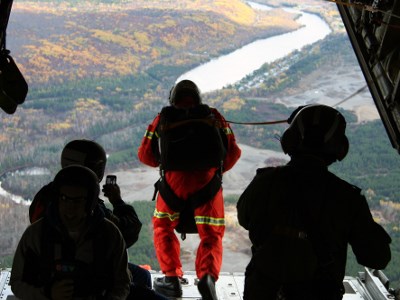He is a humble man, he who risks his life to save others.
He is intelligent, courageous and compassionate.
He is a fearless and focused survivor.
He is a search and rescue technician.
"That's why you join — to help others," Bruno Michaud said with a shrug. "It's quite simple, really. You go home feeling a sense of accomplishment."
Michaud is a warrant officer with the Canadian military's Transport Rescue Standardization Evaluation Team, based out of Trenton. He was part of the crew who took part in a joint air search and rescue exercise, along with the men and women of the Sudbury District Civil Air Search and Rescue Association (SUDSAR), which was held recently in Sudbury.
I was fortunate to witness and take part in the operation.
 

A rescuer with the Sudbury District Civil Air Search and Rescue Association leaps from from a Hercules during a recent training mission. Photo by Laurel Myers
The scenario played out something like this: I, and three other media folk as well as members of SUDSAR, joined the 424 Tiger Squadron aboard an Air Force C130 Hercules with the mission of locating a lost plane in the airspace north of Sudbury. The area was unknown to the pilot and crew of the Hercules.
After locating the lost plane in flight, the Hercules crew attempted to talk the pilot back to the Sudbury Airport. However, the aircraft ran low on fuel, and, unable to make it safely to the airport, crash landed in the outskirts of the city. Instead of redirecting a lost pilot, we were suddenly dealing with an accident scene.
We circled over the site a number of times, assessing the situation. Through our series of passes over the site, a two-way radio was dropped down, streamers were tossed from the Hercules to judge the wind, then survival and rescue equipment was floated down as well. On our last pass over the site, Michaud, and fellow SAR-tech Eric Boivin, lept out of the plane with enough gear strapped on to sustain themselves for the next 48 hours, and parachuted down to the location to administer the necessary first aid to the victims and complete the rescue.
As the rest of us flew back to the airport, I had a sense that I just witnessed the workings of a well-oiled machine. Every step of the exercise was executed with calculated precision and confidence. Each of the team members knew exactly what the other was going to do, long before it happened.
 
 

Rescue in a timely fashion is essential and that's what these people strive to accomplish.
Dave Scott,
SUDSAR unit director
Michaud was by my side for much of the exercise, enlightening me on the realities of his job. Despite my endless questions and his detailed answers, Michaud stayed intently focused on the task at hand, always keeping his eyes on the ground and his mind on the victim.
The exercise was organized by SUDSAR, which is made up of volunteers that provide support for the military in searches and rescues.
The organization provides a safety netting to the public that many don't even know exists.
"CASARA (the umbrella unit of SUDSAR) has nine units across Ontario," said Dave Scott, SUDSAR unit director. "The agency is 100 per cent volunteer. We train regularly in the air and on the ground ... to basically make sure we have resources ready, trained and organized to provide assistance to the military when there is a need in an actual scenario."
While Scott said the kind of scenario we went through doesn't often play out in real life, "thank heavens," the reality is they're ready to go if and when it does.
"Rescue in a timely fashion is essential and that's what these people strive to accomplish," Scott said.
"There's always accidents in the search and rescue business," he continued. "But often, it's false alarms — either pilots that forgot to disclose flight plans or ELTs (Emergency Locating Transmitters) that have gone off accidentally.
"Throughout the year, there are always a number of genuine crashes or aircraft that are lost and the 424 squadron and local CASARA units are called into play to locate the missing aircraft."
Scott also emphasized that each of the members of SUDSAR are involved "because we have an interest or background in aviation and recognize the need for the service." Not only do they volunteer their time, they also volunteer their vehicles or aircrafts.
"Funding is always scarce," he said. "We operate on a tight budget from the Department of National Defence through CASARA. However, all of our office expenses, local equipment, everything we use, including wear and tear on our aircraft, basically is at the expense of the volunteers."
But like Michaud said, "That's why you join — to help others."
 
We're lucky to have people like this watching over us.
For more information on the local unit, visit sudsar.ca.
Laurel Myers is the sports and lifestyle editor for Northern Life. 
